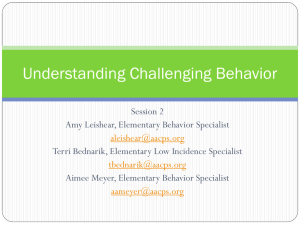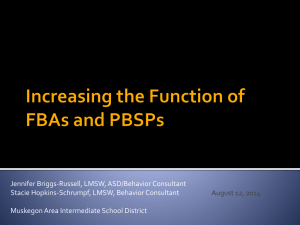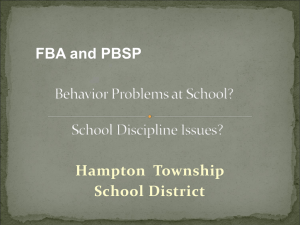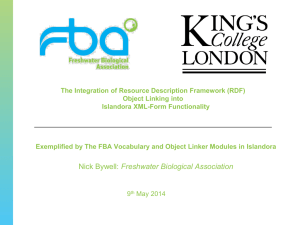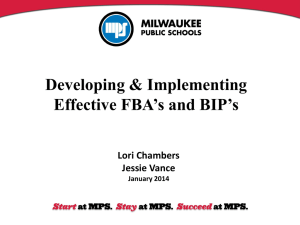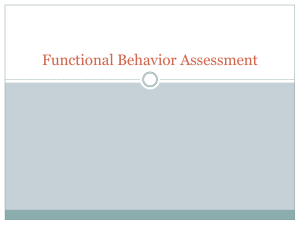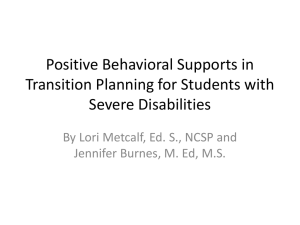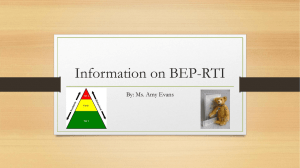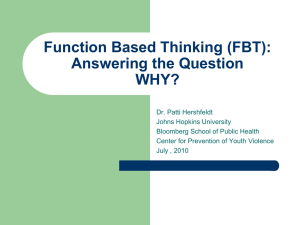Practical FBA Training - basicfba
advertisement
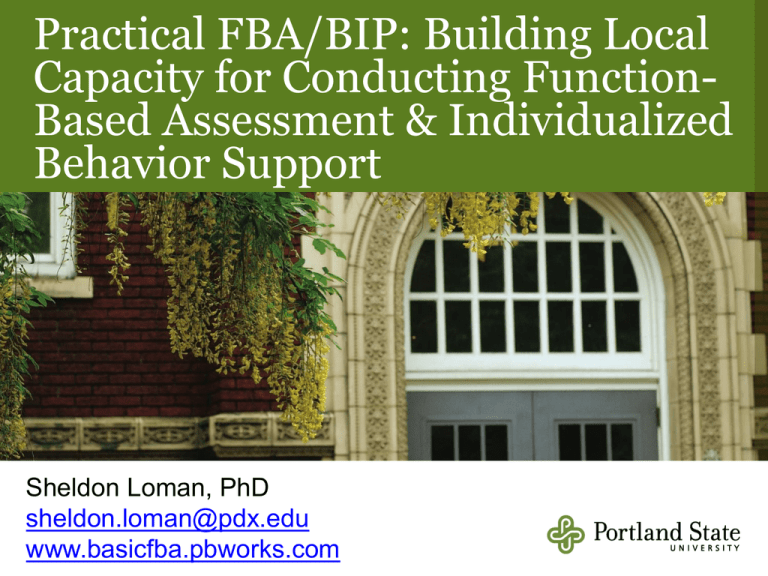
Practical FBA/BIP: Building Local Capacity for Conducting FunctionBased Assessment & Individualized Behavior Support Sheldon Loman, PhD sheldon.loman@pdx.edu www.basicfba.pbworks.com Who’s here? o Administrators? o Teachers? o Paraprofessionals? o Behavior Specialists? o Other related services? o Others? o How Many FBAs have you personally conducted?? o 0-3? o 4-10? o 11-20? o Too many to count?? Instructional Practices for People w/ Significant Disabilities Positive Behavior Support Educational Systems Change Goals/Outcomes By the end of the day today you will be able to… • Use Practical FBA/BIP Manual, Process, & Materials in order to conduct FBA and (possibly train others) to conduct FBA and design Function-based behavior supports. • Specifically define behavior, identify variables that trigger problem behavior, and determine the function/ pay-off of student problem behavior. • Conduct a Functional Assessment Checklist for Teachers and Staff (FACTS) interview • Identify the critical features of a behavior support plan that will make student problem behavior irrelevant, inefficient, and ineffective. 4 Today’s Agenda 9:30-10:30 Introduction to Practical FBA/BSP Defining Behavior (Activity Packet pages 2-5) 10:30-10:50 Break 10:50-12:15 Investigating Behavior (Activity Packet pages 6-12) 12:15-1:00 1:00-2:30 Lunch Observing Behavior (pages 13-20) 2:30-2:50 2:50-4:00 Break Critical Features of Behavior Support Planning (pages 21-23) A primary goal of FBA is to…. • guide the development of effective positive interventions based on the function of the behavior (e.g. tangible, escape, attention, automatic; Horner, 1994). FBA is…. • an empirically supported practice that has been demonstrated to improve both the effectiveness & efficiency of behavioral interventions in schools • Blair, Umbreit, & Bos, 1999; Carr et al., 1999; Ingram, Lewis-Palmer, & Sugai, 2005; Lee, Sugai, & Horner, 1999; Newcomer & Lewis, 2004. Newcomer & Lewis, 2004 Challenges schools face today are not finding what works, but implementing what works. Fixsen, Naoom, Blase, Friedman, & Wallace, 2005 • Since 1997 FBA has not been implemented widely in schools. • Not due to lack of knowledge, but to practicality of use “Scaling Down to Scale up” • Scott, Alter, & McQuillan (2010) • In order for FBA to be applied in classrooms we need to simplify the practices associated with effective FBA • It is essential to use straightforward language, rationale, and examples of how FBA can be applied in the context of classroom 10 Concern • Behavior specialists are often overwhelmed with Basic Message: requests to conduct functional behavioral assessments and building behavior support plans. Any time you feel overwhelmed the answer is likely to include investing in the training of others. Behavior Support Specialist Train & coach teachers on classroom management Support Teams building behavior support plans from Assessment information Train 1-2 people per school to conduct “basic” FBA & BSP Current Issues and Needs… • Do people already know how to do FBA in your schools? • Can a district leader/behavior specialist teach FBA procedures in a reasonable amount of time? • Are the basic FBAs developed by school personnel valid for building behavior support plans? • Do our school teams understand the CRITICAL FEATURES of function-based interventions ? • Do we have materials that are practical and effective for use by district/behavior specialists? “Work Smarter NOT Harder…” By using the 4 “P”s • Proactively build capacity- Train 1-2 school personnel in each school with a “flexible” role to conduct FBA/BSPs for students with mild/moderate problem behaviors • Parsimonious tools- Use simple tools and terminology that are relatable to school personnel • Practical Trainings- Provide short training sessions that teach “less more thoroughly” based on established instructional practices • Prioritized follow-up- Through use of quick in-training assessments to determine those participants that will require more follow-up coaching Training Series • 4 training sessions on conducting functional behavioral assessments (FBA) for students with mild to moderate behavioral problems in schools. • The training series teaches participants to conduct interviews and observations in such a way as to precisely determine the relationship between student problem behavior and the context: – What the problem behaviors are. – When, Where, & Why a student’s problem behaviors occur. • A summary of this information will help an individual student team develop effective behavioral supports that: -prevent problem behaviors from occurring -teach alternative behaviors -& effectively respond when problem behaviors occur. Practical FBA vs Comprehensive FBA Focus of this training series Practical FBA Comprehensive FBA For: Students with mild to moderate problem behaviors (behaviors that are NOT dangerous or occurring in many settings) Students with moderate to severe behavioral problems; may be dangerous and/or occurring in many settings What: Relatively simple and efficient process to guide behavior support planning Time-intensive process that also involves archival records review, familycentered planning, and collaboration with agencies outside of school Conducted by whom: School-based personnel (e.g., teachers, counselors, administrators) Professionals trained to conduct functional assessments with students with severe problem behaviors (e.g., school psychologists, behavior specialists) 16 Practical/Basic FBA process D.A.S.H. Session #1 Define behavior in observable & measurable terms Session #2 Ask about behavior by interviewing staff & student -specify routines where & when behaviors occur -summarize where, when, & why behaviors occur See the behavior Session #3 -observe the behavior during routines specified -observe to verify summary from interviews Hypothesize: a final summary of where, when & why behaviors occur Session #4 17 Format of Practical/Basic FBA Training Sessions (pg.5) Objectives Checks for Understanding Review Comments/ Questions Activities Tasks Key Points New & Improved* RACER *based on recent research Replace problem behavior with a socially acceptable, efficient behavior that allows student to obtain the pay-off/function Antecedent strategies to directly address triggers to prevent problems & prompt replacement behaviors based on the function of behavior Correct behaviors by quickly & effectively redirecting student to replacement behavior Extinguish behaviors by ensuring that problem behaviors do NOT pay off for the student (i.e. does not result in the function of behavior) Reinforce replacement & desired behaviors based on function/pay off for the student Examination of Efficacy of Practical/Basic FBA for use by school personnel • Determined that staff with flexible roles in schools (e.g., counselors, administrators) can be trained to conduct FBA for students with mild to moderate behavior problems (i.e., students with recurring problems that do not involve physical aggression or violent behaviors). • Determined the efficacy and acceptability of Practical FBA methods and tools with school personnel. • Loman & Horner, in press • Journal of Positive Behavior Interventions [JPBI] Methods: 3 Phases of the Study Phase 1- Practical FBA training on FBA tools & methods provided to 12 school professionals. -Pre- & Post-Tests of FBA knowledge Phase 2- 10 of the 12 Trained participants conducted an FBA according to procedures they were taught for one student within their school. -Using Practical FBA tools: interviewed, observed, and hypothesized summary of student behavior. Phase 3- Functional analyses conducted by researcher to test each participant’s hypothesis/summary statement -Experimental manipulations to determine the efficacy of the Practical FBA training . Results: Phase 1 Pre/Post Training FBA Knowledge 100 97% 96% 93% 87% 80 60 Pre 39% Post 40 20 0 Cohort 1 99% Inter-rater Total Agreement on 25% of tests. Cohort 2 Cohort 3 Overall N=12 Overall Pretest M= 39.50% (SD=18.82%) Overall Posttest M= 92.55% (SD=7.22%) Results: Phase 2 Acceptability Ratings Strongly 6 Agree 5.6 5.5 5.7 5.5 5.6 5.3 Agree 5.5 5.7 5.4 5 5 4 3 2 1 Equipped me Strongly disagree Will Use Again Suggest to Others Tools Easy to Use Teacher FACTS Student FACTS N=10 ABC Form Confident Inform Intervention Time Reasonable Overall Benefit Results: Phase 3 Comparison of Summary Statements Generated from Interviews • 9 out of 10 of the summary statements hypothesized by the FACTS interviews with teachers were verified by results of experimental functional analysis. • The one FACTS summary statement that was not verified by FA actually resulted in further clarification from the direct observation. • The school participant decided to use the results from the direct observation which resulted in a function that was verified by experimental functional analysis. 60-minute Function-based Behavior Support Training Results Overall Mean Increase by 30% Borgmeier, Loman, Rodriguez, in prep Accessing Training Materials www.basicfba.pbworks.com 26 www.basicfba.pbworks.com Find all the training materials Here! 27 Participant Manual Training Materials • Participant Materials for trainings (pp. 1-77) • When training – each participant should get a participant manual (at least pp. 1-77) • Blank Forms (pp. 78-91) • FACTS Interview Forms (for Staff & Student) • ABC Recording Forms • Behavior Support Planning Forms • Quick Reference Guide (pp. 92-108) • Presentation Slides x Session (pp. 109-153) Is this something you want to do in your district? • Would you like to implement the ‘Practical FBA’ training in your district? • What steps do you need to take to propose this idea and begin moving forward? • District commitment & planning • Identifying teams & appropriate attendees • What additional support would you need to deliver the curriculum? 29 Preparing to Train Practical FBA in your District 30

